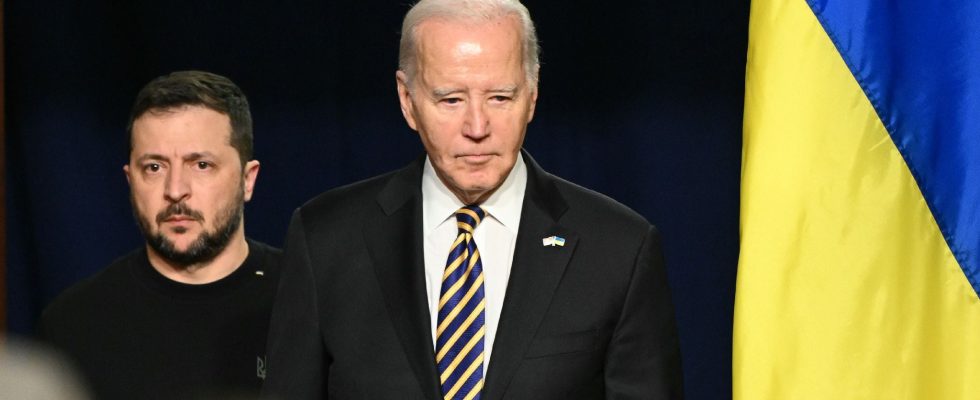Emmanuel Macron’s comments on the possibility of sending allied troops to Ukraine were not unanimous. The United States and Kiev’s European allies on Tuesday rejected the comments of French President Emmanuel Macron, believing the day before that the sending of Western troops to Ukraine could not “be excluded”. In addition to the United States, NATO, Germany, Spain, Italy and the United Kingdom opposed it.
The Kremlin, for its part, judged that it was “absolutely not in the interest of these countries” to send soldiers to Ukraine. The simple fact of evoking this possibility constituted “a very important new element” in the conflict, added the spokesperson for the Russian presidency, Dmitri Peskov.
Information to remember
⇒ Zelensky in the Balkans to rally support against Russia
⇒ A proposal for the use of frozen Russian assets in favor of Ukraine emerges
⇒ The United States on Tuesday ruled out any idea of sending troops to Ukraine
Zelensky in the Balkans to rally support against Russia
In the middle of an international tour, Ukrainian President Volodymyr Zelensky is taking part in a security conference in Albania on Wednesday, his first trip to the Balkans since the Russian invasion launched two years ago. Albanian Foreign Minister Igli Hasani announced his arrival Tuesday evening in Tirana, assuring that his country “stands in solidarity with Ukraine in its heroic fight against Russia”, in a message on social networks.
Before arriving in Tirana, Volodymyr Zelensky, in the middle of an international tour, visited Saudi Arabia to discuss this country’s mediation in the exchange of prisoners of war between Kiev and Moscow and the proposed “peace formula” by Kiev to put an end to the Russian invasion.
Washington says no to ground troops
-The United States on Tuesday ruled out any idea of sending troops to Ukraine, a hypothesis raised the day before by French President Emmanuel Macron. One by one, American spokespersons, from the White House to the State Department via the Pentagon, categorically rejected the idea during the press briefings which punctuate a typical day in Washington. “President Biden has been clear that the United States will not send troops to fight in Ukraine,” said Adrienne Watson, deputy spokesperson for the National Security Council (NSC).
Asked whether the United States was also ruling out sending troops to Ukraine for training purposes, for example, State Department spokesman Matthew Miller replied: “We are not going to send troops to the field in Ukraine.
Western troops in Russia: the Kremlin’s response
Asked about the risk of a direct conflict between NATO and Russia, in the event of a military presence in Ukraine, Kremlin spokesperson Dmitry Peskov replied that “in this case, we should not talk about probability, but of inevitability. Mr. Peskov added that NATO countries “should also evaluate” the consequences of such actions “and ask themselves whether this is in their interests, and above all in the interests of the citizens of their countries”, concluded Dmitri Peskov .
Moldova: MPs from Transdniestria meet, sparking fears
MPs from Transdniestria, a pro-Russian separatist region of Moldova, are meeting on Wednesday, officially to address economic issues, against a backdrop of fears of a request for the territory to be annexed to Russia, exacerbated by tensions with Ukraine. This small territory located between Moldova and Ukraine seceded after a short war in 1992 against the Moldovan army. Russia still maintains 1,500 soldiers there who are supposed to carry out a peacekeeping mission, according to official figures.
But since the Russian attack in February 2022 on kyiv, conjectures have regularly resurfaced about a possible Russian attack from Transdniestria towards the large Ukrainian port city of Odessa, on the Black Sea.
Yellen calls on G7 for “urgent” solution
US Treasury Secretary Janet Yellen said on Tuesday it was “urgent” for G7 countries to agree to seize interests in frozen Russian assets and direct them to Ukraine. “It is necessary and urgent that our coalition finds a way to unlock these frozen assets to contribute to Ukraine’s long-term resistance and reconstruction efforts,” she said during a press conference in Sao Paulo, in Brazil, where she will participate on Wednesday and Thursday in a meeting of G20 finance ministers.
The idea of returning to Kiev billions of dollars from the Russian central bank or Russian oligarchs close to power, frozen by the West, is gaining ground, while the cost of supporting Ukraine weighs more and more heavier on the finances of developed countries. These assets were frozen, particularly in Europe and the United States, after the start of the Russian invasion of Ukraine two years ago.
